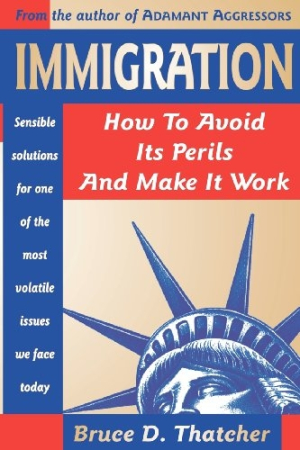Immigration
How to Avoid Its Perils and Make It Work
Immigration is a hot-button political topic for many Americans. What most people forget is that the heated debate over immigration is almost as old as the United States itself. What is more important to understand is that nearly all countries in the world have similar debates about immigration; history has shown that well-thought-out policies can be a positive, strengthening force for a country while poor, weak ones can be destabilizing.
For historian Bruce D. Thatcher, these moments in history are teachable ones for modern policymakers, politicos, or just about anyone who feels like wading into the debate. That’s what makes Immigration: How to Avoid Its Perils and Make It Work an extremely interesting and powerful work.
Thatcher begins his book by defining several important factors to consider when writing immigration policy. He believes immigration must serve the well-defined, long-term interests of a nation, immigration must be controlled to enhance national interest, and immigrants must be willing to become part of the host country’s culture.
Thatcher then uses examples from several countries to create case studies. He begins by looking at US policies established between 1788 and 1920 and how those shaped the mythos of the melting pot. He also shows readers how Mexico’s immigration policies eventually led to a civil war (which ended with the secession of Texas), how Australia’s strict immigration laws kept the country 98 percent “white” until the 1970s, how immigration in Palestine led to war and resulted in the indigenous population’s loss of their land, how colonialism and religion still influence France’s immigration policies today, and more. Each study provides an executive summary, a look at the specific laws enacted, a commentary on and analysis of the case (with questions to consider), and recommendations for further reading.
All of this makes Immigration a surprisingly compelling read. Thatcher keeps his histories short and concise, and at any point in the book, readers can either flip to the executive summary of a case to read a snapshot of the issue or go to the analysis section to further examine specific laws and figures.
Thatcher also succeeds by providing facts in a logical prose. There’s no room for politics because every sentence is shaved to its factual core and often footnoted. The author implores his readers to “resist the urge to make moral judgments, however justified” because “applying moral values will tend to cloud the lessons to be learned.”
Immigration is the second book in the History Speaks Today series, a project designed to help non-historians make decisions based on the past. Immigration would be a reasonable guide for a senator on Capitol Hill just as easily as it could become a well-thumbed reference for a political science student.
Reviewed by
Katerie Prior
Disclosure: This article is not an endorsement, but a review. The publisher of this book provided free copies of the book and paid a small fee to have their book reviewed by a professional reviewer. Foreword Reviews and Clarion Reviews make no guarantee that the publisher will receive a positive review. Foreword Magazine, Inc. is disclosing this in accordance with the Federal Trade Commission’s 16 CFR, Part 255.

